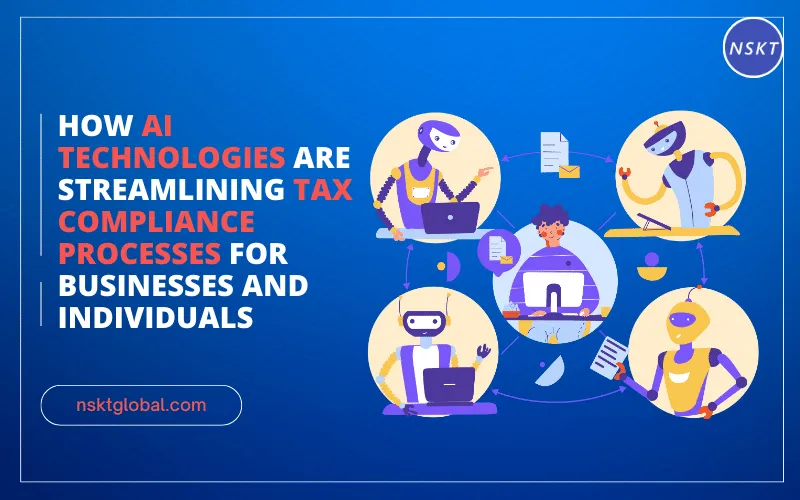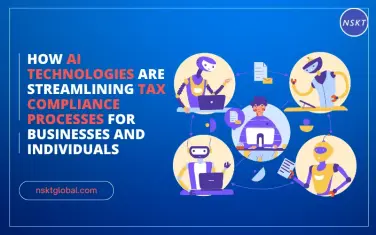Table of Contents
In today's fast-paced and technology-driven world, artificial intelligence (AI) has penetrated various industries, revolutionizing the way businesses and individuals operate. One such area where AI is making a significant impact is tax compliance. From preparing tax returns to optimizing processes, AI technologies are streamlining tax compliance processes for businesses and individuals, ultimately making the daunting task of tax management more efficient and accurate than ever before.
Can AI Prepare Tax Returns?
Gone are the days of manual tax return preparation that involved poring over stacks of documents and meticulously inputting data. With AI, the process of preparing tax returns has been transformed into a streamlined and automated task. AI-powered tax software can extract relevant information from various sources, such as financial records, receipts, and invoices, and populate the required forms with remarkable precision. This not only reduces the chances of human error but also saves an enormous amount of time.
AI-powered tax software automates data extraction and populates tax forms accurately, minimizing errors and saving time.
How is AI Used in Tax?
AI's role in tax compliance extends beyond simple data entry. Machine learning algorithms can analyze complex tax regulations and ever-evolving laws to ensure accurate tax calculations. By learning from historical tax data, AI systems can identify patterns, anomalies, and potential deductions that might be missed by human tax professionals. Natural language processing (NLP) capabilities enable AI to interpret and understand tax-related documents, extracting essential information for further processing.
AI's machine learning algorithms analyze tax regulations, identify patterns, and interpret complex tax documents, improving accuracy and compliance.
How Will AI Affect Tax Professionals?
The integration of AI in tax compliance doesn't replace tax professionals; instead, it augments their capabilities. Tax professionals can now focus on higher-level tasks, such as strategic tax planning and providing personalized advice to clients. With AI handling repetitive and time-consuming tasks, tax professionals can allocate their energy toward offering value-added services and deepening client relationships. AI has become a powerful tool that empowers tax professionals to deliver more comprehensive and insightful guidance.
AI empowers tax professionals to focus on strategic planning and personalized advice, elevating their role in the tax compliance process.
How Companies Use AI in Tax Preparation
One example of how AI technologies are streamlining tax compliance processes for businesses and individuals in the USA is through the use of AI-powered tax preparation software.
Companies like Intuit, which offers TurboTax, and H&R Block have integrated AI and machine learning into their tax preparation software to make the process smoother and more efficient for users. Here's how it works:
- Data Collection and Extraction: AI algorithms can extract relevant financial data from various sources, such as bank statements, receipts, and other financial documents. Users can take pictures of their documents using a smartphone, and the AI-powered software can automatically scan and extract the necessary information.
- Categorization and Deduction Identification: AI algorithms can categorize expenses and income, helping users identify potential deductions and credits they might qualify for. This reduces the risk of missed deductions and ensures accurate reporting.
- Automated Form Filling: AI-powered tax software can automatically populate the appropriate tax forms with the extracted data, minimizing the need for manual data entry. This reduces the chances of errors and saves users a significant amount of time.
- Real-Time Guidance and Suggestions: As users enter their financial data, AI-driven software can provide real-time guidance and suggestions to help optimize their tax situation. This might include recommendations on tax-saving strategies, investment decisions, and retirement contributions.
- Faster Processing and E-Filing: Once the data is accurately input, AI-powered tax software can quickly perform complex calculations, ensuring accurate tax liability calculations. The software can then electronically file tax returns with the IRS, expediting the process and reducing the likelihood of errors.
- Continuous Learning and Improvement: AI systems can learn from user interactions and feedback, improving their accuracy and efficiency over time. This means that with each tax season, the software becomes better at understanding individual financial situations and optimizing tax outcomes.
- Security and Privacy: AI-powered tax software employs advanced security measures to protect sensitive user data. Encryption, secure servers, and other safeguards help ensure that personal and financial information remains confidential.
What Are the Benefits of AI in Taxation?
The incorporation of AI in taxation brings forth a multitude of benefits that enhance both efficiency and accuracy throughout the tax compliance journey.
- Enhanced Accuracy: AI-driven tax solutions significantly reduce the chances of human errors, minimizing the risk of incorrect calculations or missed deductions.
- Time Savings: Automation of manual tasks expedites the tax preparation process, allowing businesses and individuals to file their taxes accurately and on time.
- Cost Efficiency: By automating repetitive tasks, businesses can reduce the need for extensive manual labor, leading to cost savings in the long run.
- Adaptability to Changes: AI systems can quickly adapt to changes in tax laws and regulations, ensuring that tax calculations remain up-to-date and compliant.
- Advanced Insights: AI's data analysis capabilities provide valuable insights into financial data, enabling proactive tax planning and strategy development.
- Reduced Workload: With AI handling data entry and calculations, tax professionals can focus on strategic consulting and fostering client relationships.
- Minimized Fraud: AI algorithms can detect unusual patterns or anomalies that might indicate fraudulent activities, bolstering security and compliance efforts.
- Consistency: AI ensures consistent application of tax rules and regulations, reducing discrepancies across various tax documents.
- Real-time Assistance: AI-powered chatbots and virtual assistants can provide real-time answers to tax-related queries, offering convenience and support to users.
- Scalability: AI solutions can scale easily to handle varying levels of complexity, making them suitable for both individual taxpayers and large enterprises.
AI in taxation brings enhanced accuracy, time savings, cost efficiency, adaptability to changes, and advanced insights, among other benefits. By automating many of the manual and time-consuming aspects of tax preparation, AI technologies enable businesses and individuals to complete their tax compliance processes more efficiently, accurately, and with reduced stress.
Conclusion
AI technologies are reshaping the landscape of tax compliance by simplifying processes for businesses and individuals. The ability of AI to prepare tax returns accurately, analyze complex tax regulations, and augment the role of tax professionals is revolutionizing how taxes are managed. The benefits of AI in taxation, such as enhanced accuracy, time savings, and advanced insights, demonstrate its potential to streamline and improve the tax compliance experience. As AI continues to advance, it is clear that its role in taxation will only grow, making tax management more efficient, accurate, and convenient for all.





